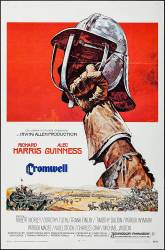Corrected entry: In the arraignment scene where Cromwell charges King Charles with treason, he refers to him as "King Charles the FIRST". This title would only be used retroactively, as it pre-supposes that there was a successor also named Charles. e.g.Queen Victoria was not known as Queen Victoria the FIRST.

Cromwell (1970)
1 corrected entry
Directed by: Ken Hughes
Starring: Richard Harris, Alec Guinness, Robert Morley, Dorothy Tutin
Factual error: In the scene where the king attempts to seize the five members from Parliament, Cromwell makes a dramatic refusal to leave and proposes various "Laws" to prevent his arrest. Cromwell was not one of the five members whom the King tried to arrest and no law can come into force until it had been signed by the reigning Monarch anyway.
Suggested correction: It's more of a threat than a declaration.
King Charles: Mr. Cromwell, you are impertinent.
Oliver Cromwell: Such issues are beyond good manners, sir. Catholicism is more than a religion. It is a political power. Therefore, I am led to believe there will be no peace in Ireland until the Catholic Church is crushed.
Trivia: After the execution of Charles I / Alec Guiness, Oliver Cromwell / Richard Harris returns to his home. Sitting by the fire, he is consoled by his wife: he can now put the cares and worries of war and politics behind him, and enjoy a quiet life as a country gentleman. This cosy domesticity is rudely interrupted when some of his old colleagues arrive to tell him tell him that he is now needed to run the country. He protests that, as a country gentleman he would be unfit for such a role, but he reluctantly assumes power. In fact, by the time of Charles I's execution Oliver Cromwell was one of the most powerful political figures and military commanders in Britain, and actively continued commanding armies in Ireland, Scotland and England, and involving himself in government. Although rejecting a suggestion that he should be crowned king (after much deliberation), he was quite willing to take the title of 'Lord Protector' and govern England, Scotland, Ireland and Wales until his death in 1658.
Join the mailing list
Separate from membership, this is to get updates about mistakes in recent releases. Addresses are not passed on to any third party, and are used solely for direct communication from this site. You can unsubscribe at any time.
Check out the mistake & trivia books, on Kindle and in paperback.




Correction: She most certainly was, just as the first Queen Elizabeth was referred to as Queen Elizabeth the First during her reign - and just as Charles was referred to as King Charles the First during his reign. Do you think that having had eight King Henries they hadn't worked out the rules of succession by the time someone called Charles got to the throne?